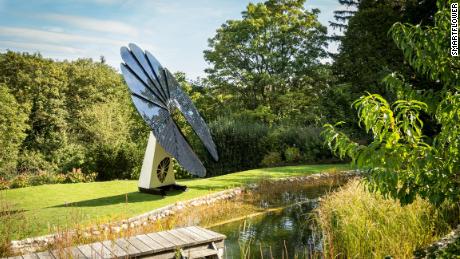Solar power is booming in Germany as Russia turns down the gas
Germany #Germany

In the first six months of this year, Germany saw a 22% jump in the installation of solar systems, compared with the same period last year, according to data shared with CNN Business by the German Solar Association. This included residential and commercial uses, from small installations on private rooftops to large solar farms, the group said.
For companies in the renewable energy industry, that has created a major rush in sales — and an additional strain on supply chains.
Demand for solar power was already on the rise in Europe’s biggest economy, as energy prices surged, policy incentives were introduced and adoption of the technology became more mainstream. But more recently, consumers have also faced ever higher utility bills, scorching temperatures, and renewed anxiety over whether they’ll be able to keep the heat on this winter. For many households, the biggest fear is that Russia will turn off the tap completely this winter. The German government has already set in motion a crisis management plan that could see rationing to businesses if that happens.
“This [demand] has only gotten stronger with the war against Ukraine, which is happening on our doorstep,” David Wedepohl, managing director of the German Solar Association told CNN Business.
“This is something that’s very much on people’s minds.”
German officials have responded to the crisis by calling on consumers to save energy. Some municipalities have already reacted by pulling back on basic needs such as lights, showers and heating.
Jim Gordon, the CEO of Smartflower, said the geopolitical turmoil had also pushed more people to make the switch to solar. The company provides sunflower-shaped solar power devices to corporate campuses, universities and homes.
“Our business is booming because there’s a perfect storm of elements converging that are really lifting solar energy,” Gordon told CNN Business.
“People are concerned about energy security,” he said. “An autocratic dictator can turn the valve on a gas pipeline and shut off energy, but nobody can control the sun.”
Soaring sales
Schneider Electric (SBGSF), a European industrial and energy giant, says demand for its solar-powered heating systems in Germany have “almost doubled” so far this year compared to the same period in 2021.
The company’s sustainability arm, which advises businesses on clean energy procurement, has also reached “an all-time peak” in consultancy requests, according to Konstantin Elstermann, the firm’s vice president of home and distribution.
Similarly, Sonnen, a German solar battery provider, has seen its orders “more than double in comparison to last year,” because of an “increased desire for [people] running their homes with renewable energy,” said CEO Oliver Koch.
In a statement to CNN Business, Koch said his team had noted “an additional uptick in demand since the end of February,” when the war began, and was “continuously expanding our production capacity to keep pace with demand.”
Demand is so high, Smartflower is now expecting to quadruple its sales in Germany this year, according to managing director Robert Sawyer.
“We’ve done more business in the first six months of 2022 in Germany than we did in all of 2021,” Sawyer said, adding that sales in the country had doubled so far this year.


A Smartflower installation. The maker of the solar power system says it has doubled its business in Germany so far this year, citing higher demand after the invasion of Ukraine.
Supply chain hurdles
Such booms don’t come without challenges, however.
The industry is currently facing severe labor shortages, said Elstermann from Schneider Electric.
“Some electricians are booked up three to six months in advance,” he told CNN Business.
“This bottleneck almost surpasses the current shortage of raw materials and production capacity. We know that the supply problems due to the pandemic are temporary, but the shortage of skilled workers remains,” Elstermann said.
Wedepohl said the industry was racing to address the problem. Many electricians who left their jobs over the past decade have been “reentering” the market, while roofers are also being called on to help with installations, he added.
“A lot of installers are out there putting out extra shifts, training people, bringing new people on,” he said. “It is a challenge, but it is definitely a moment that we hope we can rise to.”
The sustainability question
For now, Germany has resorted to firing up its coal power plants to reduce its gas consumption — and ensure the country keeps the lights on.
But Chancellor Olaf Scholz has made it clear the government isn’t happy about it.
“It is bitter that we now have to temporarily use some power plants that we had already shut down because of Russia’s brutal attack on Ukraine. But it’s only for a little while,” he said in a message last month.
Similar conversations are taking place across Europe.
This year, the United Kingdom also announced a push for other power sources, including wind and nuclear energy. And for some consumers, alternatives to gas heating, such as wood-burning fireplaces, have become more popular.
This month, Austrian climate minister Leonore Gewessler called for more green energy projects to help the country wean itself off Russian gas.
“We need to get ourselves off this dependence — cubic meter per cubic meter, windmill per windmill, PV installation per PV installation,” she told CNN’s Sara Sidner, referring to the units used in building solar and wind energy capacity.
“Because we see that our dependency on fossil fuels is used as a weapon in a war,” Gewessler said.
“Winter is coming,” said Wedepohl, noting that most homes in Germany were heated with gas. “Europeans … are also in this pretty collectively.”
— CNN’s Chris Liakos and AJ Davis contributed to this report.